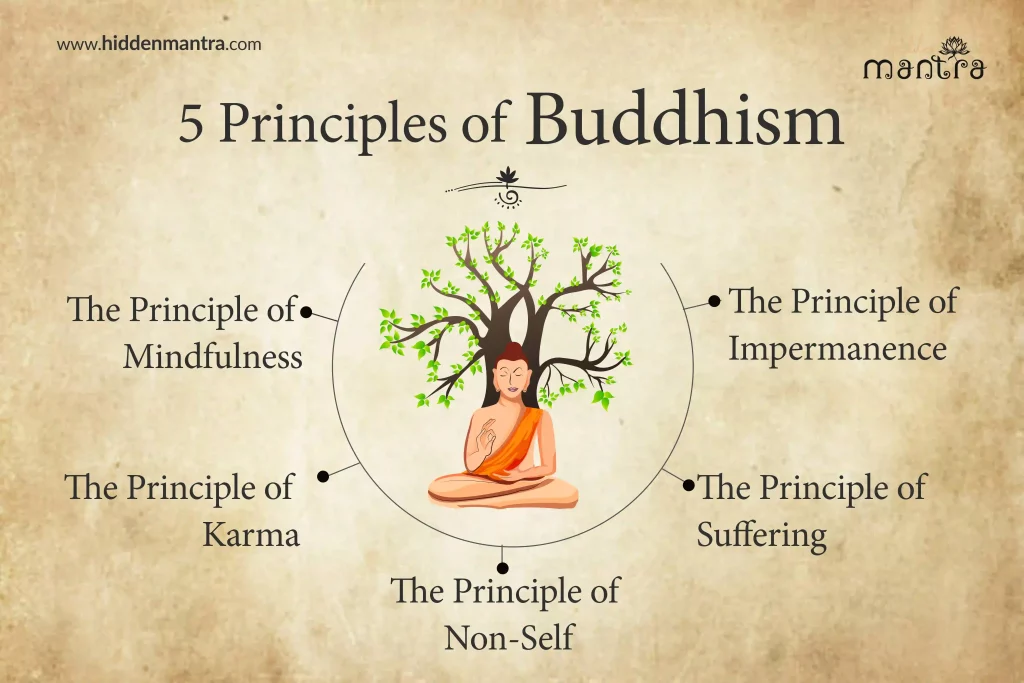Table of Contents
ToggleBuddhism, a profound philosophy and way of life, offers valuable insights into finding inner peace and contentment. At the heart of this ancient tradition are five fundamental principles that guide practitioners on their journey towards self-discovery and enlightenment. In this blog post, we will delve into these principles and explore their significance in leading a more meaningful and fulfilling life.
5 Precepts of Buddhism
The Five Precepts are those principles of ethics in Buddhism that provide a foundation for a moral conduct in life. These are commitments to refrain from causing harm and pursue a peaceful, mindful way of living. Among the five are:
- Do not kill – Rejection of harming or killing any form of life; thus, the existence of compassion, acceptance, and respect for whatever forms of life exist.
- Do not steal – Do not steal, or take what is not yours without permission.
- Do not engage in sexual misconduct – Maintain moral conduct when relating, avoiding conduct that offends or prostitutes another physically or emotionally.
- Do not speak falsely – Speak truthfully and kindly, avoiding lies, harsh words, and idle gossip.
- Do not take intoxicating drinks or drugs
Banish from your realm those things that muddle the mind, that lead to carelessness or harm.
Precepts of Buddhism and what they mean
Precepts 1 – Do not kill
No killing
Avoid all actions that kill and do harm, including those that result in human or animal death. Respect and preserve life so that it promotes love and kindness. This precept allows you to live harmoniously with others so peace can be cultivated within and around you.
Precepts 2 – Do not steal
No stealing
Do not take anything that is not freely given. Respect the effort and ownership of others. This precept builds trust and fairness in personal and social relations.
Precepts 3 – Do not engage with sexual misconduct
No sexual harm
Avoid actions that exploit or harm others in relationships. Avoid being unfaithful, untrue, and inconsiderate. This precept builds trust, love, and mutual respect in both personal bonds and the broader community.
Precepts 4 – Do not speaking falsely
No lying
Speak only the truth, avoiding lies, hurtful words, or gossip. Words have the power, and using them wisely builds trust and peace. Truthful speech supports clarity, kindness, and stronger relationships with others.
Precepts 5 – Do not take intoxicating drinks or drugs
No intoxication
Avoid substances like alcohol or drugs that cloud your mind and lead to unwise actions. A clear mind helps you stay mindful, make better choices, and live a balanced, peaceful life.
5 Principles of Buddhism
- The Principle of Impermanence
- The Principle of Suffering
- The Principle of Non-Self
- The Principle of Karma
- The Principle of Mindfulness

The Principle of Impermanence
The first principle of Buddhism is the recognition of impermanence, known as “anicca” in Pali. It teaches us that everything in the world is in a constant state of change and flux. From the shifting seasons to the growth and decay of living beings, impermanence is an undeniable truth of existence. By adopting this principle, we learn to let go of attachments and expectations, understanding that nothing remains the same forever. This insight allows us to find peace amidst life’s inevitable ups and downs, fostering resilience and adaptability.
The Principle of Suffering
Central to Buddhism is the understanding of suffering, referred to as “dukkha.” It encompasses the pain, dissatisfaction, and satisfactoriness that are part of human existence. However, Buddhism offers hope by teaching that suffering is not an inherent, unchangeable condition. By recognizing the causes of suffering, such as craving, attachment, and ignorance, we can begin to address them and move towards liberation and true happiness.
The Principle of Non-Self
The concept of “anatta” challenges the notion of a permanent, independent self. Buddhism teaches that there is no unchanging essence or soul within us but a collection of ever-changing physical and mental phenomena. By understanding this principle, we can free ourselves from the ego-driven attachments and self-identifications that often lead to suffering. It opens the door to compassion and interconnectedness, realizing that all beings are interdependent and part of the same fabric of existence.
The Principle of Karma
Karma, the law of cause and effect, holds that our actions have consequences. Buddhism teaches that every intentional action, whether physical, verbal, or mental, creates an imprint that will shape our future experiences. By cultivating mindful awareness of our thoughts, words, and deeds, we can make choices that lead to positive outcomes and personal growth. This principle empowers us to take responsibility for our lives, knowing that we have the ability to shape our destiny through conscious action.
The Principle of Mindfulness
Mindfulness, known as “sati,” is the practice of being fully present and aware in each moment. It involves observing our thoughts, emotions, and sensations without judgment or attachment. Through mindfulness, we develop a deep understanding of our inner world, as well as the external environment. This heightened awareness enables us to break free from automatic reactivity patterns and cultivate a sense of peace and clarity. Mindfulness is a powerful tool that can be applied to all aspects of life, enhancing our relationships, work, and overall well-being.
Learn Buddhist principles for healthy and happy relationships
The Principles of Buddhism highlight the importance of compassion or empathy, mindfulness, and non-attachment in maintaining healthy and happy relationships. Compassion or Empathy is a core value among the main principles of Buddhism.
This enables us to understand and share the feelings of our loved ones thereby strengthening our emotional connection with each other. Among the other Buddhist principles, mindfulness encourages us to be present and fully engaged with our partners or our friends. It helps us to be attentive rather than distracted or caught up with our thoughts.
Another important Buddha principle of life is non-attachment. It helps us to give up unrealistic expectations and unwanted thoughts. It teaches us to appreciate our partners or friends for who they are. By understanding and incorporating these principles of Buddhism into our relationships, we can easily cultivate trust, mutual understanding, and a willingness to grow together. This can help you lead a healthy and satisfying relationship with your other being.
How Buddhist principles can improve your work-life balance?
In a highly advanced and stressful world, maintaining a good and harmonious work-life is like a constant struggle. However, the principles of Buddhism offer many important values for easily achieving work-life balance. As mentioned earlier, the three important Buddhist principles include compassion, mindfulness, and non-attachment.
The practice of compassion helps us to become more empathetic in work relationships, leading to a stronger collaborative force and reduced conflicts. Mindfulness is another important principle of Buddhism. The principle of mindfulness helps us to stay focused and present in the moment. It reduces stress and improves productivity in work life.
One of the main Buddha principles of life is non-attachment encourages us to free ourselves from the thought of needing to control every aspect of our life. It allows flexibility and adaptability in keeping your work-life balance. Incorporating these principles of Buddhism into our daily lives can help us in dealing the problems and demands of personal and professional life with greater ease.
Conclusion
Adopting the 5 principles of impermanence, suffering, non-self, karma, and mindfulness, we embark on a transformative journey towards inner peace and freedom. Buddhism offers timeless wisdom and practical guidance for navigating life’s challenges and finding meaning in our existence. As we incorporate these 5 principles of Buddhism into our daily lives, we discover the potential for profound personal growth, compassion, and true happiness. May these principles serve as beacons of light, illuminating our path towards a more awakened and fulfilling life.
By visiting the Hidden Mantra blog page you can access additional Budhha-related blogs that will help you expand your knowledge, cultivate inner peace, and foster personal growth along your spiritual journey.



















